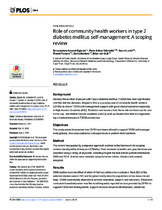| dc.contributor.author | Egbujie, Bonaventure Amandi | |
| dc.contributor.author | Delobelle, Peter Arthur | |
| dc.contributor.author | Levitt, Naomi | |
| dc.contributor.author | Puoane, Thandi | |
| dc.contributor.author | Sanders, David | |
| dc.contributor.author | van Wyk, Brian | |
| dc.date.accessioned | 2019-10-14T06:37:48Z | |
| dc.date.available | 2019-10-14T06:37:48Z | |
| dc.date.issued | 2018 | |
| dc.identifier.citation | Egbujie BA, Delobelle PA, Levitt N, Puoane T, Sanders D, van Wyk B (2018) Role of community health workers in type 2 diabetes mellitus self-management: A scoping review. PLoS ONE 13(6): e0198424. https://doi.org/10.1371/ journal.pone.0198424 | en_US |
| dc.identifier.issn | 1932-6203 | |
| dc.identifier.uri | https://doi.org/10.1371/ journal.pone.0198424 | |
| dc.identifier.uri | http://hdl.handle.net/10566/5027 | |
| dc.description.abstract | Background:
Globally the number of people with Type 2 diabetes mellitus (T2DM) has risen significantly over the last few decades. Aligned to this is a growing use of community health workers (CHWs) to deliver T2DM self-management support with good clinical outcomes especially in High Income Countries (HIC). Evidence and lessons from these interventions can be useful for Low- and Middle-Income countries (LMICs) such as South Africa that are experiencing a marked increase in T2DM prevalence.
Objectives:
This study aimed to examine how CHW have been utilized to support T2DM self-management globally, their preparation for and supervision to perform their functions.
Method:
The review was guided by a stepwise approach outlined in the framework for scoping reviews developed by Arksey and O’Malley. Peer reviewed scientific and grey literature was searched using a string of keywords, selecting English full-text articles published between 2000 and 2015. Articles were selected using inclusion criteria, charted and content analyzed.
Results:
1008 studies were identified of which 54 full text articles were selected. Most (53) of the selected studies were in HIC and targeted mostly minority populations in low resource settings. CHWs were mostly deployed to provide education, support, and advocacy. Structured curriculum based education was the most frequently reported service provided by CHWs to support T2DM self-management. Support services included informational, emotional, appraisal and instrumental support. Models of CHW care included facility linked nurse-led CHW coordination, facility-linked CHW led coordination and standalone CHW interventions without facility interaction.
Conclusion:
CHWs play several roles in T2DM self-management, including structured education, ongoing support and health system advocacy. Preparing and coordinating CHWs for these roles is crucial and needs further research and strengthening. | en_US |
| dc.language.iso | en | en_US |
| dc.publisher | PLOS | en_US |
| dc.subject | Type 2 diabetes mellitus (T2DM) | en_US |
| dc.subject | Community health workers (CHWs) | en_US |
| dc.subject | South Africa | en_US |
| dc.subject | Support services | en_US |
| dc.subject | Intervention | en_US |
| dc.title | Role of community health workers in type 2 diabetes mellitus self-management: A scoping review | en_US |
| dc.type | Article | en_US |

